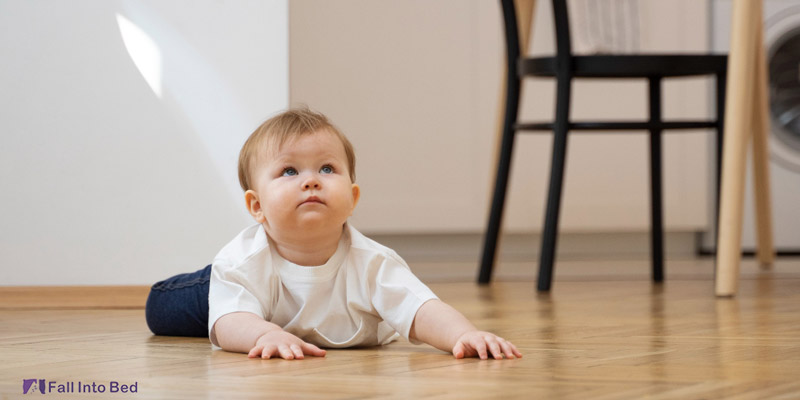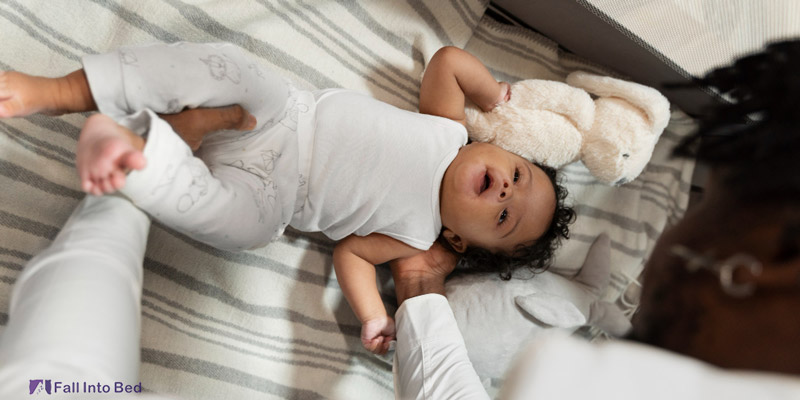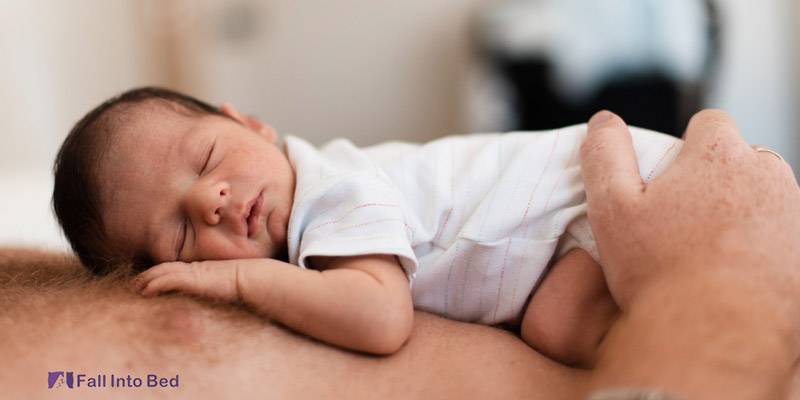Ever wondered why babies sleep with their butt in the air? It’s one of those adorable and mysterious positions that many infants naturally adopt. This cozy posture actually has a lot to do with their time in the womb, their developing muscles, and a sense of security.
Let’s take a closer look at why babies love to sleep in this cute, “froggy” pose and what it means for their growth and comfort!
What is the Froggy position?
In froggy sleeping position, your infant is sleeping on their stomach with their hands bent underneath them, and their hips flexed, which raises their cute butt slightly in the air. This position resembles a frog, hence the name.

Reasons why babies sleep with their butt in the air
Babies start raising their butt and adapt a froggy position due to several reasons:
Comfort
This position looks like the position they had in the womb. So, infants usually take this position since it reminds them of the good old times they had in their mommy’s belly. It provides comfort and a sense of security, resembling the curved-up position they used to have.
Natural flexibility
New-born babies are extremely flexible, especially in their hips and legs, due to their position in the womb. Therefore, the butt-in-the-air position just takes advantage on this flexibility.
Developmental milestones
You’d be surprised to know that sleeping in the froggy position is actually a good sign regarding developmental milestones. Sleeping with butt in the air strengthen babies’ hips and legs, which can then prepare them for the crawling and walking.
Developmental milestones has more than one effect on babies’ sleep.

self-soothing
The tucked-up position can feel cozy and comforting for babies, helping them to relax and have high quality sleep.
Does sleeping with butt in the air affect babies’ development: Significance and safety
One thing you need to take onto consideration as the parent, is the recommended sleeping positions for babies. Studies have revealed that we should put babies to sleep on their back, to reduce the risk of sudden infant death syndrome (SIDS) until they pass one year old.
However, if babies flip onto their stomachs by themselves during sleep, it’s usually considered safer as they get older and gain more control over their movements. But you should start placing them on their back for sleep and let them settle into a comfortable position on their own.
The second safety tip about babies who sleep in the butt-in-the-air position, is about airway. Sleeping in this position might cause some babies to shift into positions that could compromise their airway, especially if they are old enough to roll over.

How to help your infant promote healthy sleeping habits?
Helping your baby develop healthy sleep habits doesn’t have to be complicated. Here are some simple, down-to-earth tips that can make a big difference:
1. Stick to a Bedtime Routine
Babies thrive on routines, so try to do the same few calming activities every night before bed. A warm bath, a gentle massage, reading a short story, or singing a lullaby can signal to your baby that it’s time to wind down. There are other techniques that you can put your little one to sleep in less than a minute.
Though, a bedtime routine might be difficult to manage if your little one is teething. But you’ve got this!
2. Be Consistent with Sleep Times
Try to put your baby to sleep and wake them up around the same time every day. This helps their little body get into a rhythm and makes falling asleep easier.
3. Don’t Skip Naps
Naps during the day are super important. A well-rested baby will actually sleep better at night. If they skip naps, they can become overtired, which makes it harder for them to settle down and have a consistent sleep cycle.
4. Create a Cozy Sleep Space
Make the room dark, quiet, and not too hot or cold. Some babies like white noise, so you could try a fan or a white noise machine to help soothe them to sleep.

5. Put Them Down When They’re Sleepy, Not Asleep
Lay your baby down when they’re drowsy but still awake. This teaches them to fall asleep on their own, without needing to be rocked or fed until they’re fully out. Otherwise, they might get used to sleeping in your arms, which can create problems in the future.
6. Practice Safe Sleep
Always put your baby on their back to sleep in a crib with no soft toys, blankets, or pillows. A firm mattress and fitted sheet are all they need for safe sleeping. Sometimes, babies sleep with their butt in the air, and this is totally normal. It’s just a cozy position they love! But make sure you monitor them as they rest.
If your baby refuses to sleep in their crib, there are some measures you can take, to help them get used to their crib.
7. Pay Attention to Tired Signs
Watch for signs that your baby is tired, like rubbing their eyes, yawning, or getting fussy. Don’t wait until they’re overtired – that can actually make it harder for them to fall asleep.
If your baby is experiencing sleep regression, there are some things you should take into consideration.
8. Cut Back on Night Feedings Gradually
As your baby gets older and doesn’t need to eat as often at night, slowly reduce the number of night-time feeds. This helps them learn to sleep longer stretches.

9. Be Patient
Babies need time to learn how to sleep well, and it won’t always be perfect. Consistency is key, so don’t get discouraged if things take a while to click. You’re both learning together!
It’s all about creating a routine that works for your baby and sticking to it. With a little patience and consistency, you’ll both be getting better sleep in no time.
Sweet froggy dreams!🐸








